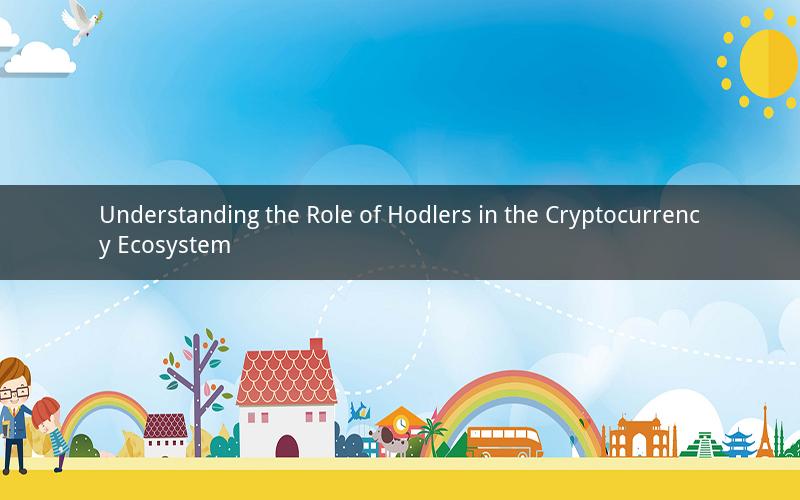
In the ever-evolving world of cryptocurrencies, the term "hodler" has gained significant attention. But what exactly is a hodler, and why is it crucial in the cryptocurrency ecosystem? This article delves into the concept of hodlers, their impact on the market, and the factors that influence their decisions.
What is a Hodler?
A hodler, in the context of cryptocurrencies, refers to an individual or entity that buys and holds a particular cryptocurrency for an extended period, often with the intention of watching its value appreciate over time. Unlike traders who frequently buy and sell cryptocurrencies in a short span, hodlers are committed to long-term investment strategies.
The Role of Hodlers in the Cryptocurrency Ecosystem
1. Market Stability
One of the primary roles of hodlers is to contribute to market stability. By holding onto their cryptocurrencies for an extended period, hodlers help prevent excessive volatility in the market. This stability is crucial for the growth and adoption of cryptocurrencies as a viable investment and transactional medium.
2. Long-Term Growth
Hodlers are instrumental in fostering long-term growth within the cryptocurrency ecosystem. Their commitment to holding cryptocurrencies for the long haul encourages other investors to adopt a similar approach. This, in turn, leads to increased demand for cryptocurrencies, driving up their value over time.
3. Community Building
Hodlers play a vital role in building and nurturing the cryptocurrency community. By actively participating in discussions, sharing insights, and supporting the projects they believe in, hodlers help create a strong, supportive network of like-minded individuals. This community-driven approach is essential for the success and sustainability of cryptocurrencies.
4. Encouraging Innovation
The presence of hodlers in the cryptocurrency ecosystem encourages innovation. By investing in promising projects and holding onto their tokens, hodlers provide the necessary capital for startups and established companies to develop new technologies, improve existing platforms, and expand their offerings.
Factors Influencing Hodler Decisions
1. Market Sentiment
Market sentiment is a significant factor that influences hodler decisions. When the market is bullish, hodlers are more likely to hold onto their cryptocurrencies, anticipating further price increases. Conversely, during bearish market conditions, hodlers may be more inclined to sell their holdings to mitigate potential losses.
2. Project Development
The development progress of a cryptocurrency project plays a crucial role in hodler decisions. If a project demonstrates significant advancements and delivers on its promises, hodlers are more likely to remain committed to their investments. Conversely, a lack of progress or failed promises may lead hodlers to reconsider their positions.
3. Regulatory Environment
The regulatory environment surrounding cryptocurrencies can significantly impact hodler decisions. A favorable regulatory framework can encourage hodlers to remain committed to their investments, while stringent regulations may lead to increased uncertainty and potential losses.
4. Personal Financial Goals
Hodlers' personal financial goals also influence their decisions. Some hodlers may be focused on long-term wealth accumulation, while others may be looking for short-term gains. Their individual financial objectives play a vital role in determining their approach to holding cryptocurrencies.
5. Technological Advancements
Technological advancements within the cryptocurrency space can influence hodler decisions. For instance, the introduction of new and improved blockchain technologies, better security measures, and enhanced scalability can boost hodlers' confidence in their investments.
Frequently Asked Questions
1. What is the difference between a hodler and a trader?
A hodler is someone who buys and holds cryptocurrencies for an extended period, focusing on long-term growth. In contrast, a trader buys and sells cryptocurrencies frequently, aiming for short-term gains.
2. Why do hodlers contribute to market stability?
Hodlers contribute to market stability by holding onto their cryptocurrencies for the long haul, preventing excessive volatility and encouraging other investors to adopt a similar approach.
3. Can hodlers still make money if the market is bearish?
Yes, hodlers can still make money during bearish market conditions. By holding onto their cryptocurrencies, they may benefit from future price increases when the market recovers.
4. How can a hodler determine the best time to sell their cryptocurrencies?
Determining the best time to sell cryptocurrencies is challenging, as it involves analyzing market trends, project developments, and personal financial goals. Hodlers should consider these factors before making a decision.
5. Is it necessary for hodlers to be active participants in the cryptocurrency community?
While active participation in the community is not necessary for hodlers, it can be beneficial. Engaging with the community can provide valuable insights, foster a sense of belonging, and contribute to the growth of the cryptocurrency ecosystem.
In conclusion, hodlers play a vital role in the cryptocurrency ecosystem by contributing to market stability, fostering long-term growth, and building a strong community. Understanding the factors influencing hodler decisions can help individuals make informed investment choices and contribute to the overall success of the cryptocurrency market.